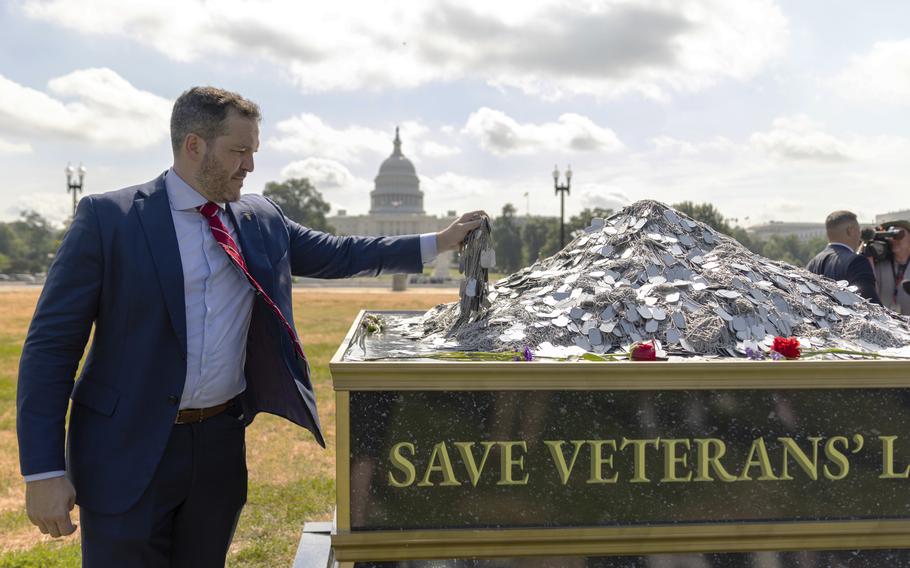
In this photo provided by the Heroic Hearts Project, Jesse Gould adds 22 dog tags signifying the number of veterans estimated to die by suicide in one day, at a memorial paying tribute to the estimated 150,000 veterans who have lost their lives to suicide over the past 20 years, displayed near the U.S. Capitol in Washington on July 10, 2024. (Michael Schoen/Heroic Hearts Project via AP)
The U.S. Senate approved a measure recently that will help save the lives of people who have risked everything for the nation but who are on the precipice of self-destruction.
Championed by a bipartisan group of 40 lawmakers, the resolution designates Nov. 17 as “National Warrior Call Day,” a major effort that draws attention to those service members and veterans perilously disconnected from family, friends and support systems.
Disconnection from others is proving fatal for veterans, with experts reporting that two-thirds of veterans who die by suicide have had no contact with services. Many are battling alone.
National Warrior Call Day marks a coast-to-coast push to connect with veterans and service members. It asks that all Americans — especially active-duty and retired military personnel — call a warrior, someone who has worn or is currently wearing the uniform, and connect them with support, if necessary. The exhortation we stress to everyone is to make a call, take a call and be honest with the service member or veteran.
The establishment of National Warrior Call Day, an effort led by Sens. Jeanne Shaheen, D-N.H., and Tom Cotton, R-Ark., is supported by the U.S. Congress, 27 Medal of Honor recipients, numerous veteran service organizations and several former secretaries of the Department of Veterans Affairs.
The National Warrior Call Day designation comes as suicides are climbing among veterans. For 2021, the most recent year of complete data examined by the VA, suicides increased by 1.8% compared to the previous year. The suicide rate far exceeds that of the general population, with veterans nearly twice as likely to die by suicide. What’s more, suicide is on the rise among women veterans for whom the rate increased over the previous year by 24% — significantly higher than the rate of increase among male veterans.
In the most recent annual assessment released last November, the VA found that suicide is the 13th leading cause of death for veterans overall and the second leading cause of death for veterans under the age of 45.
Among current U.S. service members, the trends are similarly tragic. A recent study released by the Pentagon found that Army troops are more likely to die from suicide than any other cause. The report, which examined a sample of troop deaths from 2012 to 2019, showed that soldiers are nearly nine times more likely to die by suicide than they are in combat.
National Warrior Call Day is essential for another important reason — to help reach those veterans and service members who may be suffering the effects of undiagnosed brain injuries.
Brain injuries are a signature injury of the last two decades of persistent conflict. The federal government acknowledges their prevalence — nearly 500,000 service members are believed to suffer from them. But they don’t acknowledge that their prevalence might also explain the tragically high suicide rates among veterans and servicemembers, despite growing evidence. A growing body of research is illuminating that underlying traumatic brain injury can mirror many mental health conditions.
Ending isolation is key to ending suicides. With its straightforward mission of imploring all Americans to connect with someone who has worn or is currently wearing the uniform and let them know they care, National Warrior Call Day can foster greater connectivity. Greater connection will save lives.
“Just as despair can come to one only from other human beings,” Elie Wiesel observed, “hope, too, can be given to one only by other human beings.”
National Warrior Call Day is an opportunity for each of us to do something so ordinary by making a call that results in the extraordinary — in a human connection that tethers someone to hope where there was none before.
Frank Larkin is a former Navy SEAL, 40th U.S. Senate Sergeant at Arms and father of a Navy SEAL son who died by suicide. He is chief operating officer of Troops First Foundation and chairman of Warrior Call.